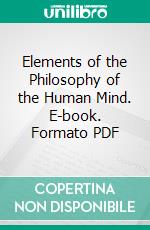Dugald Stewart eBooks
eBooks di Dugald Stewart
Resoconto della vita e delle opere di Adam Smith. E-book. Formato EPUB Dugald Stewart - Liberilibri, 2012 - Oche Del Campidoglio
Presentato nel 1793 alla Royal Society di Edimburgo da Dugald Stewart, successore di Adam Ferguson alla cattedra di Filosofia morale presso l'Università di Edimburgo, l''Account of the Life and Writings' of Adam Smith è un testo che nella sua essenzialità offre un 'reticolo' di riferimento imprescindibile per conoscere la vita e le opere di Adam Smith. Scritto solo tre anni dopo la morte del grande filosofo ed economista scozzese, l'Account ha costituito una 'fonte diretta' a cui in seguito ogni altro biografo si è ampiamente riferito. A distanza di oltre due secoli, l'opera mantiene intatti i motivi d'interesse, poiché è, a tutti gli effetti, un piccolo classico (e non solo per l''aura' del tempo che lo avvolge) del quale gli studiosi di Smith continuano a tener conto, anche dopo la pubblicazione di biografie di ben altra mole.
Dream Boats, and Other Stories: Portraits and Histories of Fauns, Fairies, Fishes and Other Pleasant Creatures. E-book. Formato PDF Dugald Stewart Walker - Forgotten Books, 2017 -
Safely through tempests and gales and over stretches of Sunlit waters you must pilot the ship. The path is strewn with icebergs, wreckage and many boats making for the same harbour. All the little ships make their trial voyage through the white-capped, dancing waves of Let 's Play and Let 's Pretend.
Elements of the Philosophy of the Human Mind. E-book. Formato PDF Dugald Stewart - Forgotten Books, 2017 -
Interested in the nature of the mind? Then you should read Elements of the Philosophy of the Human Mind, a metaphysical tour-de-force by one of the Enlightenment's most influential thinkers. Dugald Stewart was a Scottish philosopher dedicated to discovering a philosophy of mind by using Sir Francis Bacon's inductive method of reasoning. Elements of the Philosophy of the Human Mind, which was published in three volumes, is one of his most comprehensive writings on the phenomena of consciousness. In this first volume, Stewart takes readers step by step through an examination of the mind. The book begins with a chapter explaining why it is valuable, indeed essential, to study human consciousness. This is in keeping with Enlightenment thinkers, who were reminding Western civilization that studying art, philosophy and the nature of the mind itself was an endeavor that would benefit humanity. It is with these lofty aspirations that Stewart begins his exploration. Stewart takes on nearly every subject that preoccupied philosophers of the day. For example, the chapter on memory ably deconstructs the different kinds of memories, the way memory seems to be acquired and retained, and how it can be improved. This is an example of using inductive reasoning to reveal the laws applicable to memory and what it means for human consciousness. Many major philosophers appear in this book, as Stewart explains their main theories. The highlight of this section is the conversation about Nomialists versus Realists. In the debate about the nature of reality, Nomialists and Realists remain the two most entrenched positions in the Western world. Nomialists believe that there are no universal truths; instead there are things particular to a person's own creation. Stewart surveys the major players, like Hume, Hobbes and Berkeley for the Nomialists, and Plato and Aristotle for the Realists. Many sections of the book conclude with a chapter where Stewart addresses the material he discussed, anticipating readers' questions and concerns. This creates a sense that the reader is communicating with a professor. It is here where Stewart's legacy is greatest, because he was a professor of John Stuart Mill and many other contributors to Western thought. Elements of the Philosophy of the Human Mind allows the reader to learn from one of the best philosophers on the subject.


